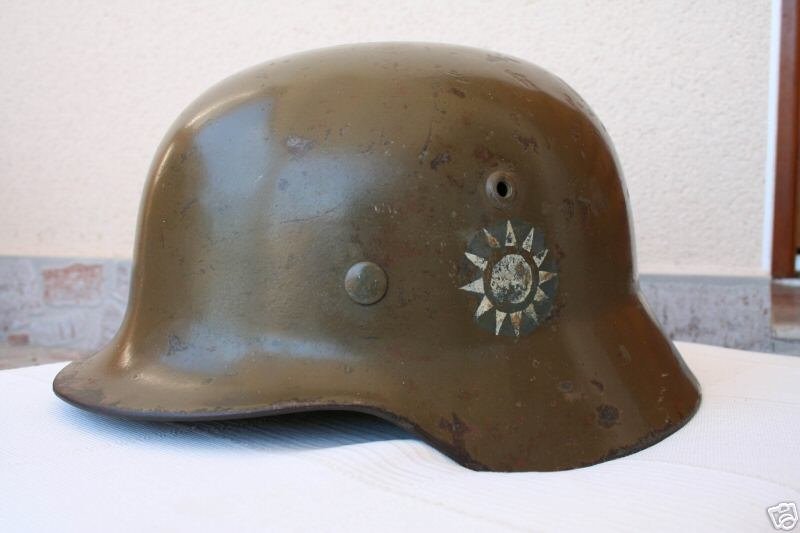Monday, October 18, 2010
柏林博物館展覽希特勒 Berlin museum studies society that created Hitler
The knuckle-dusters, truncheons and jackboots in the first case of a new exhibition on "Hitler and the Germans" in Berlin sets the tone for a stark look at how German society embraced the Nazi regime in all its brutality.
While lots of memorabilia is on show, from SS and Gestapo uniforms to a sideboard from Hitler's office, the exhibition shows how all levels of German society -- media, industry, the church, schools -- built up the Hitler cult in the 1930s and clung to it through World War Two until defeat was imminent.
Some media have portrayed the show opening on Friday in the German Historical Museum as a taboo-breaking first exhibition on Adolf Hitler himself. But the curators are at pains to stress that their focus is on the society that created the dictator.
"We don't want to focus on Hitler as a personality," said Hans-Ulrich Thamer, curator of the exhibition subtitled "Nation and Crime", at a media preview on Wednesday.
"We want to look at the rise of the regime, how it operated in power and how it fell, and the tremendous destructive potential that National Socialism unleashed," he said.
The show is housed in a modern annexe behind the museum on Unter den Linden -- the boulevard that Hitler stripped of the linden trees that gave it its name -- with no advertising, in deference to German law forbidding the display of Nazi symbols.
But inside the viewer is immersed in a world of propaganda ranging from cigarette packets with the swastika, complete with collectible uniform cards, to a handcart for selling the party paper, "Voelkischer Beobachter".
HITLER PORTRAITS
As the exhibits document the construction of the Nazi state, with its industry, autobahns and folksy celebrations of Hitler, they also reflect the growing racial hatred and discrimination.
One poster shows a mentally disabled boy beside a muscular blonde athlete and warns of the demographic dangers "if retards have four children and the able-minded have just two".
Then come displays of the yellow stars the Nazis forced Jews to wear and the striped concentration camp uniforms worn by some of the 6 million Jews murdered in the Holocaust and other Nazi victims. Among them is a tiny child's uniform from the camps.
After chronicling Hitler's downfall, the show touches on the post-war discussion of Nazism in German society, noting that the top-selling news magazine Der Spiegel put Hitler on its front cover no fewer than 46 times between 1949 and 2010.
"Since the 1990s not a single year has gone by without a Hitler portrait on the cover," the curators said.
The final exhibits mention the fascination of neo-Nazis with Hitler memorabilia and displays anti-fascist logos.
Thamer was asked about the danger the museum could lure neo-Nazis eager for a look at Hitler memorabilia. Those sort of people, he said, don't go to museums.
(Reporting by Stephen Brown; editing by Ralph Boulton)
德國柏林博物館打破戰後65年來的禁忌,展出希特勒及納粹帝國文物,展覽名稱為 ''Hilter und die Deutsche Volksgemeinschaft und Verbrechen'' (Hitler and the German Nation and Crime).
這對於戰後的德國聯邦政府而言,是很大的挑戰,因為自戰後德國制定的民主憲法,已經將納粹黨列為非法政治團體,任何納粹相關的標誌,圖騰,文物均被列為違法不可對外輸出及公開展示,在德國境內公開行納粹舉手禮也會被處以500馬克的罰金.此次德國博物館突破禁忌展出希套勒相關史料,已經引起西方各國的關切,恰巧2010.10剛好是德國償還自1918年第一次世界大戰的最後戰債,德國博物館的這項展覽,預料將會引起不小的話題.
從大量的展出收藏品上可以看到從SS和蓋世太保的制服到希特勒辦公室的餐具,顯示了納粹如何利用所有階級的德國社會,媒體,行業,教會,學校作宣傳,以建立希特勒的邪惡組織,並在20世紀30年代靠著它崛起,直到最後第二次世界大戰的失敗. 某些西方媒體描述上週五在德國歷史博物館開始的展覽重點是希特勒本人.但是策展人煞費苦心地強調其重點是當時整個德國社會精英及中產階層創造了希特勒這位獨裁者.至於該次展覽會不會吸引"納粹狂"和"新納粹光頭黨"來朝聖,主辦單則說不希望這些人來參觀!
這對於戰後的德國聯邦政府而言,是很大的挑戰,因為自戰後德國制定的民主憲法,已經將納粹黨列為非法政治團體,任何納粹相關的標誌,圖騰,文物均被列為違法不可對外輸出及公開展示,在德國境內公開行納粹舉手禮也會被處以500馬克的罰金.此次德國博物館突破禁忌展出希套勒相關史料,已經引起西方各國的關切,恰巧2010.10剛好是德國償還自1918年第一次世界大戰的最後戰債,德國博物館的這項展覽,預料將會引起不小的話題.
從大量的展出收藏品上可以看到從SS和蓋世太保的制服到希特勒辦公室的餐具,顯示了納粹如何利用所有階級的德國社會,媒體,行業,教會,學校作宣傳,以建立希特勒的邪惡組織,並在20世紀30年代靠著它崛起,直到最後第二次世界大戰的失敗. 某些西方媒體描述上週五在德國歷史博物館開始的展覽重點是希特勒本人.但是策展人煞費苦心地強調其重點是當時整個德國社會精英及中產階層創造了希特勒這位獨裁者.至於該次展覽會不會吸引"納粹狂"和"新納粹光頭黨"來朝聖,主辦單則說不希望這些人來參觀!



